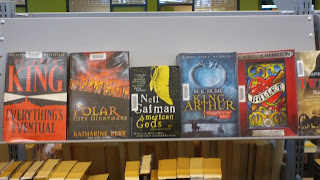You can find this book here.
I should start by writing that though this is essentially part of Doctorow's 'Little Brother' series, and number three in fact, it is also a stand-alone novel.
I did not know this when I chose to read it; but now I can understand what some references were referring to as if I had read the past books, I would have had a more complete picture. For example, I might have understood more about the bombing in San Francisco or the terms easily used by characters if I had read book one, 'Little Brother'.
Unfortunately books 1 and 2 are not available at Camden Libraries; but as I have said, you can read it and understand the story set within. I mean, the book itself gives no indication it is part of the series 😊
Anyway, back to the novel in hand ...
Masha Maximow is a compartmentalising tech wizard (though because she is a compartmentaliser, she realistically sees her skills and probably would never deem herself a wizard). Masha works for a transnational cybersecurity firm where she enables organisations and countries to keep people, states and countries in line through spying, malware and disinformation. On the side, Masha helps protestors fight against these same regimes. The problem for Masha is, can you really play both sides without hurting people you care about, let alone strangers across the world? And, has Masha really helped enough people to counteract the bad choices she has made? Can you even do that: counterbalance bad choices by making more good ones?
The setting of the novel is near-futuristic: you can see it looming on the horizon like a large rectangular server. This means you can relate to the world the characters are in. You just may not be able to understand it for at least the first third of the book. There is a lot of jargon: tech-talk for days. Doctorow's past is in technology, so he understands it clearly: I did not. However, the pace eventually picks up and the tech-speak becomes less involved (or I was able to manoeuvre through it). This might trip you up in the beginning though.
The characters work. Masha is, well, not relatable (as I am not that great at compartmentalising), but she is realistic. She juggles the world in a way that probably most of us do, whether we like ourselves for it or not. The remaining characters that we see are mostly female (except for Marcus and some side characters), and they appear strong and fleshed out.
The pace was okay. There are flashbacks within the book that you may find slow the pace, but I found the slowness came from slogging through the tech-talk more than the flashbacks. You might also find it feels long. That could be because without flashbacks it would be a much shorter novel; but it also could be the themes that slow you down. The book is not exactly made to make you think unicorns are at the end of every rainbow. Though I did enjoy that about this book.
There are also two afterwords at the end of the novel. These, and the author's note, possibly explain why the book is written the way it is and how people should be taking care of technology (it helps change the world, it can't save it: that's the general message). I liked this about the novel too.
Hopefully you find the book has enough thrills for you to keep reading, if you are looking for a focus on the thriller aspect. If you are interested in the technology and hacktivist side, there is enough of that to keep a reader content. Then you can try a couple of his other works we have in the Library.






